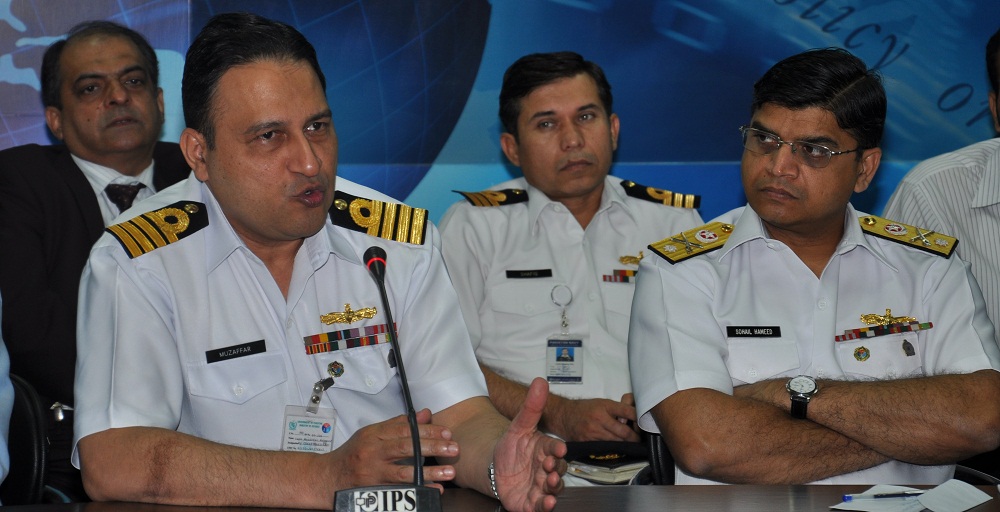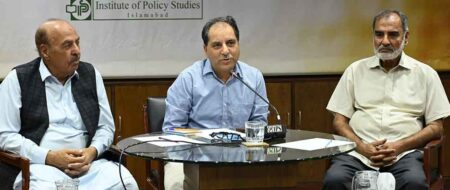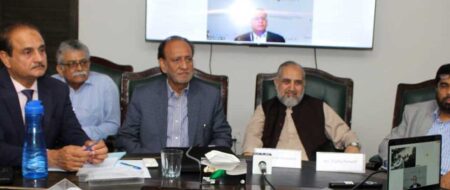Pakistan’s Maritime Sector – II ‘Blue Economy’ – Potential and Prospects
Institute of Policy Studies has a comprehensive program themed “Pakistan: Geo Political and Geo Strategic Dynamics”, which is aimed at deliberating upon various dimensions of the strategic challenges faced by the country and to find out the best possible solutions and strategies. Pakistan’s maritime sector is also a major focus under this theme.
In continuation of a series of events on maritime sector, IPS conducted a seminar titled “Pakistan’s Maritime Sector – II: ‘Blue Economy’ – Potential and Prospects” on October 29, 2013.
Vice Admiral (R) Asaf Humayun, HI (M), former vice chief of naval staff and currently serving as director general, National Centre for Maritime Policy Research was the main speaker, while it was moderated by senior IPS associate Commander (retd) Azhar Ahmad.
Vice Admiral (Retd) Asaf Humayun in his presentation deplored that the draft of national maritime policy has not been finalized despite the fact that it was prepared three-and-a-half years ago. Post 18th amendment complications and reservations of provinces, especially Sindh and Balochistan, in finalizing country’s maiden maritime policy was costing the nation billions annually, he stated.
He further said that 18th amendment in the constitution had devolved maritime functions to the provinces which lack the capacity and vision to deal with them and had not been able to take up the delegated functions even after passage of more than three years. Maritime sector should be redeemed as federal subject so that the steps for improvement of this strategically significant resource could be ensured through a unified command and integrated approach.
Noting that the policy had been drafted with the aim to bring comprehensive reforms in Pakistan’s maritime strategy and to address country’s dynamics of commerce and security, he said that delays in approval of policy have been affecting trade, economic activity and strategic interest of the country and are increasing economic, environmental and security issues for the nation.
Instead of organizing port operations under a unified command or at least through a coordinated effort, the maritime sector of the country was being dealt by different ministries separately and provincial governments. There should be an integrated approach to get rapid and long-term advantages of national sea territories, he urged.

The government should also form an executive body at the federal level to deal with maritime issues instead of the inefficient maritime coordination committee in which currently 18 secretaries represent different departments, he suggested.
Urging an integrated approach for ports and shipping he said that export processing zones, industrial areas, fisheries, warehousing facilities, rail and road transportation infrastructure, etc., alongside ports are essential to thrive upon the maritime potential in this country. He said that Gwadar port constructed with heavy investment from China, which is operational since 2008, has been unable to progress due to the lack of this integrated approach and each ton of cargo handled at Gwadar costs US$30 extra due to lack of rail or road links. The total cargo handled at Gwadar so far is only 5 million tons and just 145 ships have called at the port since 2008.
He also stressed that links to all the country’s shipping ports need up-gradation. Both ports in Karachi, he said, have no working rail service. Gwadar lacks direct road link to the up-country and even to Quetta.

The speaker said that the government should seek private investment on the development of infrastructure in ports, shipping and logistics areas, on one hand, and it should provide training to maritime professionals and skilled workers of the sector in the future, on the other, to reap the benefits of the country’s strong geo-logistic and geo-strategic position.
Pakistan has about 20,000 seafarers who have earned recognition as competent, efficient and hardworking from International Maritime Organization but their number on international ships has shrunk significantly in post-9/11 scenario. Only one-third of professional seafarers are now employed and are contributing 25 million dollars annually to the national economy. The government must make diplomatic efforts to increase their number on international ships, he underscored.
DG-IPS Khalid Rahman, at the end, thanked the participants and reiterated IPS commitment to continue providing policy inputs to the government and stakeholders in all vital areas.












